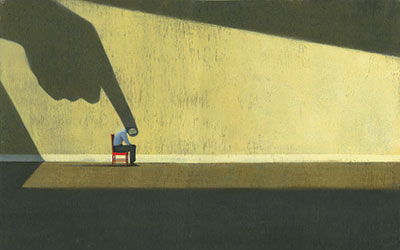Shame (noun \ˈshām\): Consciousness of shortcoming, guilt, or impropriety.
Turns out, for many therapists, this powerful and painful emotion is a significant barrier to professional development.
Doing psychotherapy is challenging in the best of circumstances. As many as 25% of clients drop out before experiencing a measureable improvement in their functioning. Of those who do continue, between 40 to 50% will end no different than when they started. And finally, 8 to 10% deteriorate while in care.
Faced with the realities of clinical practice, it’s easy for practitioners to feel they are forever falling short of their own and others hopes and expectations. Some respond with self-serving resignation: “It’s just not possible to help some people.” Others, research indicates, deceive themselves, either seeing progress where there is none or overestimating their effectiveness. Most, it is clear, struggle with the deep sense of responsibility they have assumed for relieving mental and emotional suffering.
As just one example, consider psychologist Tony Rousmaniere. Early on in his career, Tony started using a couple of simple tools to track the quality and outcome of his work. The data he gathered shook him to the core, “I was helping far fewer people than I’d thought–50% fewer!” And while his results were no different than the outcome of most, he recalls instantly thinking, “I can’t let anyone know this!”
 “If you want to improve,” Tony says, “You have to embrace the facts. It’s not about humiliation, but rather humility. Simply put, we are not as effective as we think we are. Even the most effective among us, fail about a third of the time. But, in those failures lies the key to success.”
“If you want to improve,” Tony says, “You have to embrace the facts. It’s not about humiliation, but rather humility. Simply put, we are not as effective as we think we are. Even the most effective among us, fail about a third of the time. But, in those failures lies the key to success.”
In his new book, Deliberate Practice for Therapists, Tony describes, in deeply personal and moving terms, his efforts to become a more effective therapist. He draws on the latest research on expertise and expert performance, providing a blueprint all clinicians can use to improve and fine-tune their performance via deliberate practice.
Earlier this month, I interviewed Tony about his journey and the new book. His honesty, transparency, and sage advice are inspiring. You’ll find the video below.
In the meantime, get hands on experience with deliberate practice this summer by signing up for the FIT Professional Development Intensive. For more information or to register, simply click the icon under my name. Hope to see you there!
Until then, best wishes,
Scott



The same process interferes with people (and groups) advancing their (or should I say “our”) development in whatever area.
A reasonably confident sense of self-worth enables us to face the facts and use practices (such as FIT in the clinical world) to engage in open inquiry and to change those facts — and to resist the tendency of exaggerated shame or pride to eclipse realism and humility.
The process in clinicians parallels the process in clients: When we show readiness and interest in hearing what others are experiencing, we are modeling for them the confidence in self-worth which will enable them to examine the uncomfortable, an essential step in their change, AND we are showing that we value them as active partners, thus supporting their sense of worth (though it may take a while for them to come to believe in that).
From James Baldwin: “Not everything that is faced can be changed, but nothing can be changed until it is faced.”
By the way, there are implications in this for improvement in social relations and political affairs as well. Need I say more these days?
Wow!! This is much needed in our field. I have been following your blogs over the years and they have always been meaningful. What I find most useful about your and Dr. Tony’s voices on deliberate practice is that it is much neglected in our field. Humility is sometimes mistaken by supervisors as excessive doubt and anxiety and pathologized. It is not seen as a wish to improve performance. I have, to this day, not found a performance coach. I wish Tony had said even a sentence about one instance of a behavior he was trying to practice that would take root in his performance of therapy. For instance, I try to meditate everyday because I sometimes teach meditation to my clients and if I didn’t have my own practice, I would be a phony. Thank you so much for doing this interview. I will look up the books you mentioned.
Thanks for this prompt to check out your video clip interview with Tony R. – I immediately ordered the book Deliberate Practice. It makes such sense that we need to practice our craft just like a high performance athlete or musician…this is going to take a lotta work… I remember how I happily thought I had reached the end of having to study when I got my PhD…sigh!
Sue
Scott,
Good to hear from you. Most definitely shame played a part in my evolution as a therapist, particularly as a I began to follow up more thoroughly. One adjustment that I found helpful was to hold less grandiose and more realistic ideas about what was possible to achieve in therapy. A second adjustment was to work more collaboratively with clients.
Hi Scott,
This welcome blog brings up many issues. Just one of them is the question of openness to making mistakes (i.e. ‘being human’) in our training as counsellors/psychotherapists.
Via competition for grades (often the main door for higher qualifications), I think a lot of university training tends to kill our sense of openness. Too often this is combined with prescriptive/manualized approaches, which again kills spontaneity and the well established need for genuine human encounter.
These processes tend to be justified as evidence based and scientific. Ironically they are in many ways the opposite. You might care to have a look at the following article. It’s only a page long but it captures much of the confusion in our thinking about scientific progress.
Keep up the good work
The importance of stupidity in scientific research
Martin A. Schwartz
Department of Microbiology, UVA Health System, University of Virginia, Charlottesville, VA 22908, USA
e-mail: maschwartz@virginia.edu
Accepted 9 April 2008
Journal of Cell Science 121, 1771 Published by The Company of Biologists 2008
Perhaps greater than any other emotion, shame motivates learning, growth, and a desire to change the self. The affect theorist, Donald Nathanson, notes that “Shame is a teacher, often drawing us within ourselves to think deeply about the self: (1992, p. 211). What reduces the impact of shame for the therapist or patient? Naturally, we assume that pride would disavow the harsh effects of shame on one’s sense of self. Yet human connection is the real antidote to shame. That is why psychotherapy works and it is why the therapy relationship is effective: it enables the patient to expose his or her shame and, along with the therapist, navigate through those times when shame becomes an impediment to the positive working alliance.
Hi Scott,
Sure You can ask!
Well, I read Your blogpost. I interpret Shame in the sense S Tomkins has given it as an affect, helping us to back off when our interest is stopped/blocked against our will. I do not consider shame as same as guilt or shortcoming. The worst part of shame, in my sense, is when other people view me in a way I don’t want to be viewed, leaving a feeling of no more belonging to the group. And we are group-people and in need of the group for our survival. Very short my view of shame.
To Your question:
Well, in the early 90’s there was a strong discussion in our professions own paper (Psykologtidningen) that made me feel shamed. Looking back on this situation I think it was som kind of Projective identification. The discussion was about who is competent to do psychoteraphy. The strong view from some was that You needed to have a certain education, authorized psychoterapeut level 2, to be competent to do therapy. Everyone else should, for the sake of the patient, restrain from doing therapy! You were not even educated enough to judge your own incompetence if You were not a psychotherapist! I now and at that time was only a simple psychologist so I should be one of these persons unfit to do psychotherapy. I really was affected by the time – shamed! I decided to apply for the education, psychotherapist level 2, but before I could be admitted I had to do 60 hours of individual psychotherapy as a patient. I did that, for one year, and it was an awful experience! I felt worse, functioned worse and was emotionally confused! I never gave the therapist any feedback of mic experience and she never asked for it.
In these years was the time when I met You and Your way of viewing the meeting with the client/patient. It went directly to my heart and became a stronghold against the shame I earlier had felt. I dropped the idea of education to psychotherapist and and went on the trail of listening to the patient more fully, not trying to be the expert but a good companion in the talking journey and I try to keep that trail ever since.
When I meet patients/clients I never feel shame. I can be sorry when I understand that what I’m doing not is helpful and can’t find the ways to adjust to be helpful. I always leave these patients ensuring them that the fact that our meeting not is helpful for them not are because of them but because of what I could give wasn’t helpful and I try to the best of my ability to find a way for them for new help which hopefully is working better form them. I don’t think of what other professionals think about my work, my interest is my patients/clients point of view.
A definite shortcoming I do have is the lack of energy I have for my own improvement but I don’t feel ashamed about it. I try to learn more about problems I meet, for instance pain management, but I’m not prepared to give it lots of time. I’m trying to enjoy other parts of life than work as well. I admire people who keep on striving for there improvement, but I’m no longer there. Hopefully some of the people I meet benefit from it and I am keen to have their feedback concerning our meetings.
2005 I did therapy as a patient again for four years with a man in his 70’s and that was a very helpful experience for me as a person. One of the things I cherish from those meetings and try to convey in mine is, he liked me as person!
Good to hear from You, I don’t know if this was an answer of Your question, but some thoughts anyway…
Thats a good question Scott. Upon reflection there certainly were times when Shame based fear and guilt impacted on my confidence to take positive risks. I found as I worked on myself and became more self aware that I made these kind of decisions? attributions? mistakes? less and less. Further Shame based Guilt also cost me a number of promotions with me not accepting promotions or making the most of opportunities when they arose………….sadly a common theme in my Life LOL
Seriously though I think these ‘moments’ mostly occur at our most human times during work……….after all perfect we are not 🙂
I keep being reminded of the famous longitudinal study that found social connectedness to be our biggest protective factor………… mirror neurones………….Mindfulness…………..Attunement………………Support Just maybe getting together with peers practising micro skills discussing the latest journals a synergy of support and peer evaluation n review if you like may help therapists ongoing learning process’s and soften the more human elements of what we do?
Great food for thought thx for sparking the awareness
Sincerely Luke from Australia 🙂
Hi Scott
Thanks for some nice days in Gøteborg
Well.. shame ?.. I dont recall it having stopped me – but it has definitely been an issue I have thougt about – and then decided to go ahead anyway.
latest was at a recent staff meeting, where we talk about clients, and I had noticed that whenever SRS dropped a bit, MY clients were more likely to drop out… it was the first time I noticed it and nobody else in the team had ever spoken about it… so… embarrassed, ashamed and worried ?? yes! But fortunately more curious about it… They were Shocked !!!… no they were not… they sighed in relief… and discovered the same thing in their clients… so now we are even more aware of dropping SRS..
And I hope that my shame and worries about other peoples judgement will never stop me.. But Im quite sure it will… until I think about it… so thanks for bringing it up
Hi Scott
Thank you for the question.
I have been in clinical practice for 30 years and have, through personal reflection, supervision and personal therapy, experienced shame.
I often view it as having done, thought or said something that might be inappropriate or that I am not supposed to do. It seems to be connected to blame and self concept – not to be confused of course with arrogance.
Occasions or examples that spring to mind in professional work might be when a Client’s story mirrors something from my life that I am not proud of, when I feel helpless and stuck and feel I am not helping, when I am not fully present to my Client or when I feel blocked in the therapeutic relationship sometime perhaps due to me allowing myself become judgemental.
Thank God for clinical supervision and honesty.
These are just some examples that spring to mind from my experience not including the issues in my personal life that may or may not interfere.
If, after all this time, I was not prepared to be a reflective practitioner I would be ineffective and should probably change career.
Thankfully this has not been the case and I humbly attempt to journey with and help Clients.
I hope this helps.
Keep up the interesting and great work.
Damian